英语语法过去将来进行时
高中英语语法与写作基本功训练过去完成及过去将来几种过去时态的搭配(学案与教案)

语法与写作基本功训练:过去进行时(学生版)Part I:语法学习一、过去进行时与when和while引导的过去进行时例1:The plane was late. Detectives were waiting at the airport all morning. They were expecting a valuable parcel of diamonds from South Africa.例2:When the plane arrived, some of the detectives were waiting inside the main building while others were waiting on the airfield.例3:While two detectives were keeping guard at the door, two others opened the parcel.二、过去完成时概念:例:A few hours earlier, someone had told the police that thieves would try to steal the diamonds.三、过去将来时概念:例:A few hours earlier, someone had told the police that thieves would try to steal the diamonds.四、some与others概念:例1:When the plane arrived, some of the detectives were waiting inside the main buildingwhile others were waiting on the airfield.例2:While two detectives were keeping guard at the door, two others opened the parcel.Part II:综合训练The plane was late (1) detectives were waiting (2) the airport all morning. They were expecting a valuable parcel (3) diamonds (4) South Africa, (5) a few hours earlier, someone (6) told the police (7) thieves (8) try to steal the diamonds. (9) the plane (10 arrive), some of the detectives were waiting inside the main building (11) others were waiting (12) the airfield. Two men (13 take) the parcel (14) the plane (15) (16 carry) it (17) the Customs House. (18) two detectives were keeping guard (19) the door, two (20) opened the parcel (21) (22) their surprise, the precious parcel was full (23) stone and sand!答案:(1) and; (2) at; (3) of; (4) from; (5) for; (6) had; (7) that; (8) would; (9) When; (10) arrived;(11) while; (12) on; (13) took; (14) off; (15) and; (16) carried; (17) into; (18) While; (19) at;(20) others; (21) and; (22) to; (23) ofPart III:句子合并练习1. The plane was late. Detectives were waiting at the airport all morning.2. They were expecting a valuable parcel of diamonds from South Africa. A few hours earlier, someone had told the police that thieves would try to steal the diamonds.3. The plane arrived. Some of the detectives were waiting inside the main building. Others were waiting on the airfield.4. Two men took the parcel off the plane. They carried it into the Customs House.5. Two detectives were keeping guard at the door. Two others opened the parcel. To their surprise, the precious parcel was full of stone and sand!答案:1. The plane was late and detectives were waiting at the airport all morning.2. They were expecting a valuable parcel of diamonds from South Africa, for, a few hours earlier, someone had told the police that thieves would try to steal the diamonds.3. When the plane arrived, some of the detectives were waiting inside the main building while others were waiting on the airfield.4. Two men took the parcel off the plane and carried it into the Customs House.5. While two detectives were keeping guard at the door, two others opened the parcel and to their surprise, the precious parcel was full of stone and sand!语法与写作基本功训练:过去进行时(教师版)Part I:语法学习一、过去进行时与when和while引导的过去进行时示例1:The plane was late. Detectives were waiting at the airport all morning. They were expecting a valuable parcel of diamonds from South Africa.示例2:When the plane arrived, some of the detectives were waiting inside the main building while others were waiting on the airfield.示例3:While two detectives were keeping guard at the door, two others opened the parcel.二、过去完成时概念:永远记住:过去完成时涉及到的是过去范畴的时间,与现在和将来无关;再请记住:当要描述的一个动作先于另外一个动作或者于某个具体的过去时间之前发生时,就要用过去完成时。
英 语语法 过去将来时及初中时态归纳
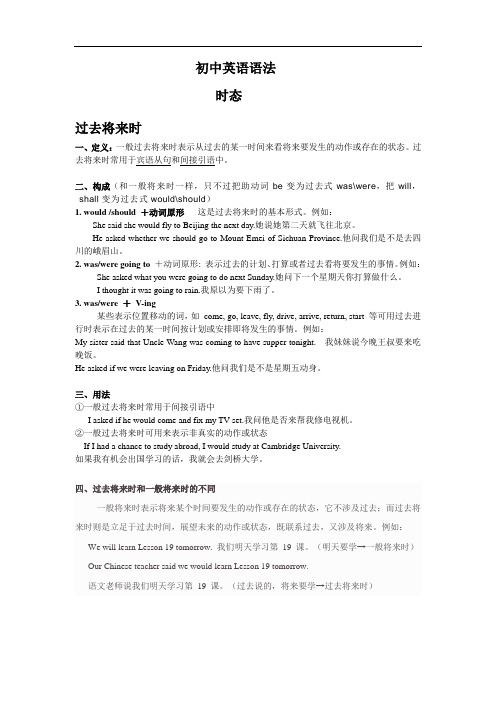
初中英语语法时态过去将来时一、定义:一般过去将来时表示从过去的某一时间来看将来要发生的动作或存在的状态。
过去将来时常用于宾语从句和间接引语中。
二、构成(和一般将来时一样,只不过把助动词be变为过去式was\were,把will,shall变为过去式would\should)1. would /should +动词原形这是过去将来时的基本形式。
例如:She said she would fly to Beijing the next day.她说她第二天就飞往北京。
He asked whether we should go to Mount Emei of Sichuan Province.他问我们是不是去四川的峨眉山。
2. was/were going to+动词原形: 表示过去的计划、打算或者过去看将要发生的事情。
例如:She asked what you were going to do next Sunday.她问下一个星期天你打算做什么。
I thought it was going to rain.我原以为要下雨了。
3. was/were +V-ing某些表示位置移动的词,如come, go, leave, fly, drive, arrive, return, start 等可用过去进行时表示在过去的某一时间按计划或安排即将发生的事情。
例如:My sister said that Uncle Wang was coming to have supper tonight. 我妹妹说今晚王叔要来吃晚饭。
He asked if we were leaving on Friday.他问我们是不是星期五动身。
三、用法①一般过去将来时常用于间接引语中I asked if he would come and fix my TV set.我问他是否来帮我修电视机。
②一般过去将来时可用来表示非真实的动作或状态If I had a chance to study abroad, I would study at Cambridge University.如果我有机会出国学习的话,我就会去剑桥大学。
英语时态表现在过去将来时态语法结构句型
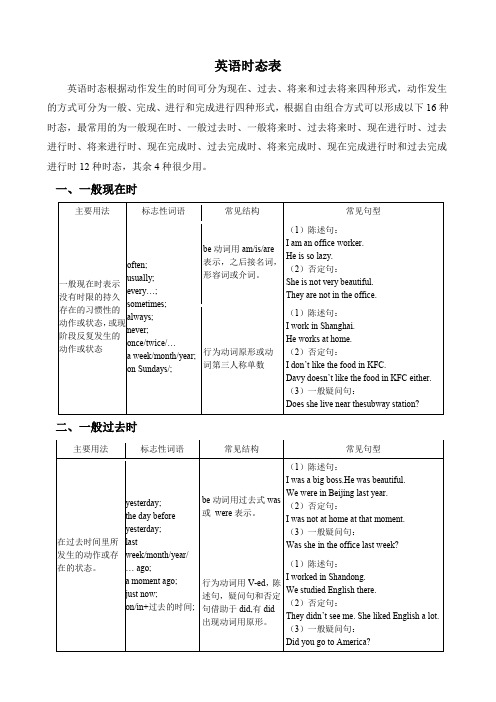
英语时态表
英语时态根据动作发生的时间可分为现在、过去、将来和过去将来四种形式,动作发生的方式可分为一般、完成、进行和完成进行四种形式,根据自由组合方式可以形成以下16种时态,最常用的为一般现在时、一般过去时、一般将来时、过去将来时、现在进行时、过去进行时、将来进行时、现在完成时、过去完成时、将来完成时、现在完成进行时和过去完成进行时12种时态,其余4种很少用。
一、一般现在时
二、一般过去时
三、一般将来时
四、过去将来时
五、现在进行时
六、过去进行时
七、现在完成时
八、过去完成时
九、将来进行时
十、将来完成时
十一、现在完成进行时
十二、过去完成进行时。
英语语法的八大时态
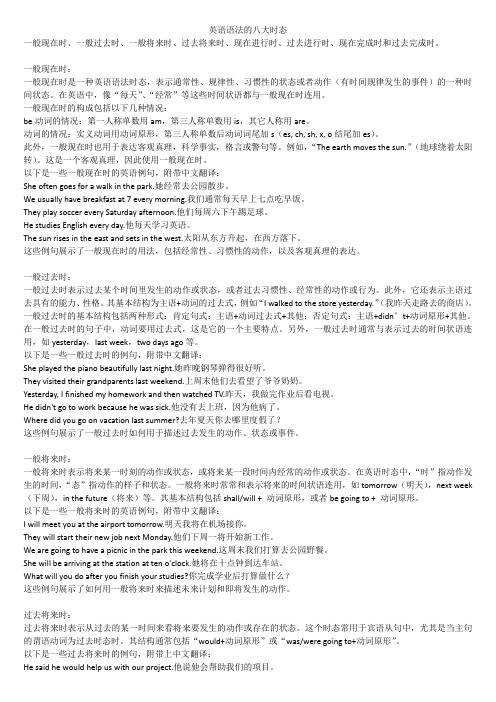
英语语法的八大时态一般现在时、一般过去时、一般将来时、过去将来时、现在进行时、过去进行时、现在完成时和过去完成时。
一般现在时:一般现在时是一种英语语法时态,表示通常性、规律性、习惯性的状态或者动作(有时间规律发生的事件)的一种时间状态。
在英语中,像“每天”、“经常”等这些时间状语都与一般现在时连用。
一般现在时的构成包括以下几种情况:be动词的情况:第一人称单数用am,第三人称单数用is,其它人称用are。
动词的情况:实义动词用动词原形,第三人称单数后动词词尾加s(es, ch, sh, x, o结尾加es)。
此外,一般现在时也用于表达客观真理,科学事实,格言或警句等。
例如,“The earth moves the sun.”(地球绕着太阳转)。
这是一个客观真理,因此使用一般现在时。
以下是一些一般现在时的英语例句,附带中文翻译:She often goes for a walk in the park.她经常去公园散步。
We usually have breakfast at 7 every morning.我们通常每天早上七点吃早饭。
They play soccer every Saturday afternoon.他们每周六下午踢足球。
He studies English every day.他每天学习英语。
The sun rises in the east and sets in the west.太阳从东方升起,在西方落下。
这些例句展示了一般现在时的用法,包括经常性、习惯性的动作,以及客观真理的表达。
一般过去时:一般过去时表示过去某个时间里发生的动作或状态,或者过去习惯性、经常性的动作或行为。
此外,它还表示主语过去具有的能力、性格。
其基本结构为主语+动词的过去式,例如“I walked to the store yesterday.”(我昨天走路去的商店)。
一般过去时的基本结构包括两种形式:肯定句式:主语+动词过去式+其他;否定句式:主语+didn’t+动词原形+其他。
动词时态的全面解析准确运用过去现在和将来时

动词时态的全面解析准确运用过去现在和将来时动词时态的全面解析及准确运用过去、现在和将来时动词时态是英语语法中的一个重要部分,它用来表达动作或状态发生的时间。
正确地运用时态可以使句子更加准确、流畅,并能够有效传达我们所要表达的意思。
本文将对动词时态进行全面解析,并指导如何准确运用过去时、现在时和将来时。
1. 过去时(Past Tense)过去时用于描述已经发生过的动作或状态。
一般过去时表示的是过去某个特定时间发生的动作,例如:I watched a movie last night.(昨晚我看了一部电影。
)He lived in London for five years.(他在伦敦生活了五年。
)除了一般过去时外,过去时还有以下几种形式:1.1 过去进行时(Past Continuous Tense)过去进行时表示过去某一时间正在进行的动作,或过去某一时间段内连续发生的动作,例如:I was watching a movie when she called me.(她给我打电话时,我正在看电影。
)They were playing basketball from 4 pm to 6 pm yesterday.(昨天从下午4点到6点,他们一直在打篮球。
)1.2 过去完成时(Past Perfect Tense)过去完成时表示在过去某个时间之前已经发生的动作,例如:She had already finished her homework before he arrived.(他到之前她已经完成了作业。
)They had known each other for ten years before they got married.(他们在结婚前已经认识了十年。
)1.3 过去完成进行时(Past Perfect Continuous Tense)过去完成进行时表示过去某一时间之前一直在进行的动作,例如:I had been waiting for two hours when the bus finally arrived.(公交车最终到达时,我已经等了两个小时了。
将来进行时和过去将来时之特点分析 讲与练--高考英语复习备考

将来进行时和过去将来时之特点分析我们先来看两个句子:1. -Could I use your car tomorrow morning?-Sure. I_______(write) a report at home.2. Jane can't attend the meeting at 3 0'clock this afternoon because she______(teach) a class at that time.一、运用将来进行时的时间特点通过简单分析,同学们会很快发现这两句都在描述将来的动作,好像应该用一般将来时填空。
但是大家需要知道,时态题的考查应根据具体的时间状语。
第一句的时间状语为tomorrow morning,而不是tomorrow;第二句为 3 0'clock this afternoon而不仅是this afternoon。
这种表示将来某个时刻会发生的动作,英语中会用will be/be going to be/shall be+ doing来表示,我们称之为“将来进行时”。
今天,我们来谈谈英语中的常见语法现象:将来进行时。
将来进行时通常用于以下场景:1.表示在将来某一时刻或某一时间段正在进行的动作;2.表示根据计划、安排或预测要发生的动作,此时一般要有具体的时间状语;3.表示有礼貌地询问对方打算,还可表示亲切或委婉的语气。
例如:Make the best of your precious time and study harder-this time next year you will beenjoying the colorful campus life in your dream university!好好利用当下的美好时光,努力学习!明年这个时候你一定会在你向往的大学里享受多彩的校园生活!After you take the medicine,you will be feeling much better.吃了药以后,你就会感觉好多了。
英语时态表现在过去将来时态语法结构句型
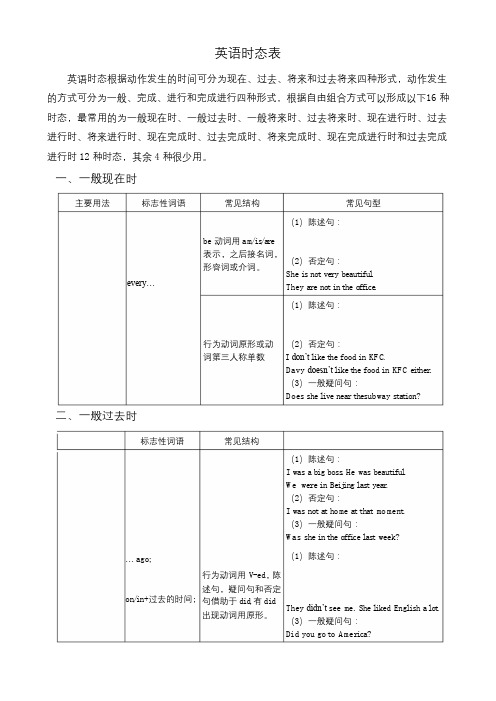
英语时态表英语时态根据动作发生的时间可分为现在、过去、将来和过去将来四种形式,动作发生 的方式可分为一般、完成、进行和完成进行四种形式,根据自由组合方式可以形成以下16 种 时态,最常用的为一般现在时、一般过去时、一般将来时、过去将来时、现在进行时、过去 进行时、将来进行时、现在完成时、过去完成时、将来完成时、现在完成进行时和过去完成 进行时 12 种时态,其余 4 种很少用。
一、一般现在时主要用法标志性词语常见结构常见句型(1)陈述句:be 动词用 am/i s /a r e 表示,之后接名词,形容词或介词。
(2)否定句:She i s no t ve ry beaut i fu l . They a re no t in the o f f i ce .every…(1)陈述句:行为动词原形或动(2)否定句:词第三人称单数I don’t l ike t he food in KFC.Davy doesn’t l ike t he food in KFC e i t her . (3)一般疑问句: Does she l ive near thesubway s ta t ion?二、一般过去时标志性词语常见结构(1)陈述句: I was a b ig boss .He was beau t i fu l . W e were in Be i j ing las t yea r . (2)否定句: I was no t a t home a t tha t mo ment . (3)一般疑问句: W as she in the o f f i ce l as t week?(1)陈述句:… ago;行为动词用 V-ed ,陈述句,疑问句和否定句借助于 did ,有 did出现动词用原形。
on/in+过去的时间; They didn’t see me. She l iked Engl i sh a lo t .(3)一般疑问句: Did you go to A mer i ca?三、一般将来时主要用法标志性词语常见结构常见句型tomorrow,任何人称I wi l l never be l i eve you aga in . W e wi l l no t buy a car nex t year . (3)一般疑问句:nex tWil l they l ive a f ive-s ta r ho te l? I’m going to go to Kongkong by a i r .否定句:We are not go ing to buy a house here .(2)一般疑问句:i s /am/are+goingto+V 原形,表示计划打算做什么事情。
英语---谓语动词的时态:进行体(现在,过去,将来)
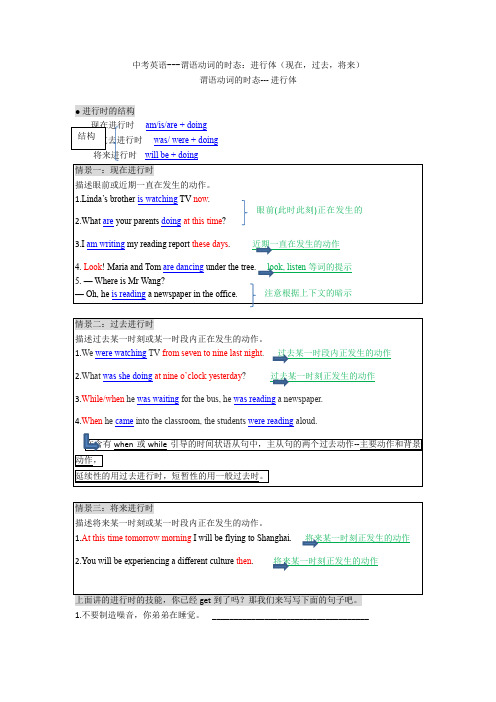
中考英语---谓语动词的时态:进行体(现在,过去,将来)谓语动词的时态--- 进行体● 进行时的结构现在进行时 am/is/are + doing过去进行时was/ were + doing 将来进行时 will be + doing1.不要制造噪音,你弟弟在睡觉。
____________________________________2.Linda 不在这,她在洗澡。
____________________________________3.昨天的这个时候,我正在做作业。
____________________________________4.当爸爸回家时,她正帮妈妈做晚饭。
____________________________________5.她边走路,边唱歌。
____________________________________答案:1. Don’t make noise. Your brother is sleeping. 2. Linda isn’t here. She is taking a shower.3. I was doing my homework at this time yesterday.4. When the father came back home, she was helping her mother make dinner.5. When she was walking, she was singing.谓语动词的综合练习题1. Beijing and Zhangjiakou _____ applying to host the 2022 Winter Olympic Games in 2013.A. beginB. beganC. have begunD. had begun2. Mr. Wang has left for Guangzhou. He ______a speech there in two days.A. givesB. gaveC. will giveD. has given3. --- I wonder whether Brazil will win the match later tonight.---Go to bed first. I will wake you up as soon as the match _____.A. startsB. startedC. will startD. is starting4. Be quiet! The students ______ a physics test in the next room.A. hadB. have hadC. were havingD. are having5. After Steven sent some e-mails, he______ surfing the Internet.A. startsB. has startedC. will startD. started6. Someone _______at the door. Can you open it?A. knocksB. knockedC.is knockingD. was knocking7. ---Are you going to anywhere?---I about visiting my sister, but I have changed my mind.A. thinkB. have thoughtC. will thinkD. thought8. ---Does this bus go to the beach?---No, You_______ the wrong way. You want the Number 11.A. goB. were goingC. are goingD. would go9. There ________a sports meeting in our school next week.A. will haveB.is going to haveC. are going to beD.is going to be10. I don't know if Tom ______here tomorrow. If he _____,I'll call you.A. comes, comesB. will come, will comeC. comes, will comeD. will come, comes11. --- Lily, why are you still here? School is over for half an hour.--- Because I ______ my task yet. I still need one more hour.A. won’t finishB. didn’t finishC. haven’t finishedD. hadn’t finished12. --- What are you busy doing these days, Mr. Zhao?---I ________my newborn baby. You can't imagine how busy I amA. look afterB. looked afterC.am looking after13.Aunt Lucy will tell us something about her trip to Australia when she _______.A. cameB. comesC. would comeD. will come14. By the end of last week, she _______in the west of China for two months helping the homeless children.A. will stayB. has stayedC. would stayD. had stayed15. ---Do you think grandpa and grandma_________late?---No, the train is usually on time.A.wereB.will beC.wasD.have been16. In Chongqing, you can often see many people dance outside together if it ______ in the evening.A. rainsB. doesn’t rainC. will rainD. won’t rai n17. ---Has your friend completed his design?--- Not yet. He ________ on it last night.A. workedB. has workedC. is workingD. was working18. --- When will A Bite of China II begin tonight?--- It ________ for ten minutes.A. will beginB. has begunC. will be onD. has been on19. ---Have you ever been to the Great Wall?---Not yet. I____ it this year.A. visitedB. have visitedC. was visitingD. will visit20. Little Tom____ computer games when his mother got home.A. is playingB. playsC. was playing答案:1. B 2. C 3. A 4. D 5. D6. C7. D 8.C 9. D 10. D 11. C 12. C13. B 14. D 15. B 16. B 17. D 18. D19. D 20. C二、英语书面表达专项训练2.书面表达初中毕业在即, 回顾三年的学习生活, 你一定有成功的体验, 如一次考试, 一次比赛, 一次表演......请你以Believe Myself, and I Will Win为题写一篇演讲稿。
英语语法分析:过去将来时的用法

英语语法分析:过去将来时的用法过去将来时的一般结构:结构:would do两个特别句型:there be 句型,be going to 结构结构用法一:Be going to 结构——表示准备,预备,方案做某事结构:主语+be动词+going to +动词原型I am going to make a bookcase.They are going to paint it.The father is going to give the bookcase to his daughter.变疑问句将be动词移到句首Are you going to make a bookcase?Are they going to paint it?Is the father going to give the bookcase to his daughter?变否定句在be动词后面加notI am not going to make a bookcase.They are not going to paint it.The father is not going to give the bookcase to his daughter.确定回答及否定回答Yes, I am. / No, I am not.Yes, they are. / No, they are not.Yes, he is. / No, he is not.特别疑问句(必背)What are you going to do?What are they going to do?What is the father going to do?结构用法二:There be 句型——表示哪里有什么东西(某处有某物)There is+单数名词+表示场所的词(一般为介词词组)There is a book in this room.There is a pen on the tableThere are+复数名词+表示场所的词(一般为介词词组)There are two pens on the table.There are three schools there.变疑问句将be动词移到句首Is there a book in this room?Are there two pens on the table?变否定句在动词后面加notThere is not a book in this room.There are not two pens on the table.确定回答及否定回答Yes, there is. / No, there is not.Yes, there are. / No, there are not.过去将来时的用法一、"would+动词原形"表示过去将来时"would+动词原形"构成过去将来时,常表示依据方案或支配即将发生的事。
英语过去将来进行 完成时解析

英语过去将来进行完成时解析过去将来进行时是英语表达中的一种语法时态,表示就过去某一时间而言,将来某一时刻或某一段时间正在进行的动作。
主要用于宾语从句中,尤其多用于间接引语中。
构成:1.过去将来进行时由主语+should(would)+be+现在分词2.否定:主语+should(would)+not+be+现在分词3.疑问:should(would)+主语+be+现在分词(+其他)基本用法:用于间接引语:They said they would be coming.(他们说了他们将要来。
)用于定语从句:The new job he would be taking was raising racing horses.(他将要接受的新工作是养赛马。
)作用:1. 过去将来进行时可以表示在过去某一时间之后即将进行的动作:例如:He said he could not come because he would be having a meeting.(他说他不能来因为要开会。
)2. 过去将来进行时表示在过去将来某一时间正在发生的动作:它常和表过去将来的时间状语连用,但上下文清楚时,时间状语亦可省略。
和将来进行时一样,它也常表计划中的事,不表意愿或打算。
它还有一个特点,即常用在宾语从句(尤其是间接引语)中。
例如:John told us that Mary would be coming next day.(约翰告诉我们玛丽第二天来。
)3. 过去将来进行时有时也可用在其它从句中:用在定语从句中:The new name he would be using was Jack Jones.(他将用的新名是杰克•琼斯。
)用在状语从句中:He would pay the rest as he would be leaving France.(其余款项,他将在离开法国时付清。
)4. 过去将来进行时也可用在独立句中:例如:The car started. Ellen James would be driving off to the university.(车子发动了。
英语语法-过去将来进行时
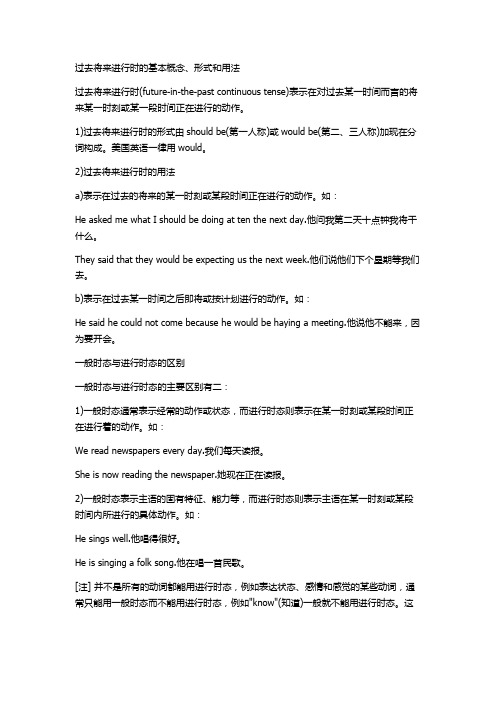
过去将来进行时的基本概念、形式和用法过去将来进行时(future-in-the-past continuous tense)表示在对过去某一时间而言的将来某一时刻或某一段时间正在进行的动作。
1)过去将来进行时的形式由should be(第一人称)或would be(第二、三人称)加现在分词构成。
美国英语一律用would。
2)过去将来进行时的用法a)表示在过去的将来的某一时刻或某段时间正在进行的动作。
如:He asked me what I should be doing at ten the next day.他问我第二天十点钟我将干什么。
They said that they would be expecting us the next week.他们说他们下个星期等我们去。
b)表示在过去某一时间之后即将或按计划进行的动作。
如:He said he could not come because he would be haying a meeting.他说他不能来,因为要开会。
一般时态与进行时态的区别一般时态与进行时态的主要区别有二:1)一般时态通常表示经常的动作或状态,而进行时态则表示在某一时刻或某段时间正在进行着的动作。
如:We read newspapers every day.我们每天读报。
She is now reading the newspaper.她现在正在读报。
2)一般时态表示主语的固有特征、能力等,而进行时态则表示主语在某一时刻或某段时间内所进行的具体动作。
如:He sings well.他唱得很好。
He is singing a folk song.他在唱一首民歌。
[注] 并不是所有的动词都能用进行时态,例如表达状态、感情和感觉的某些动词,通常只能用一般时态而不能用进行时态,例如"know"(知道)一般就不能用进行时态。
这类动词还有be(是),have(有),1ove (爱),hate(恨),want(想要),1ike(喜欢),think(认为),believe(相信),see(看见),hear(听见)等。
英语语法16种时态总结
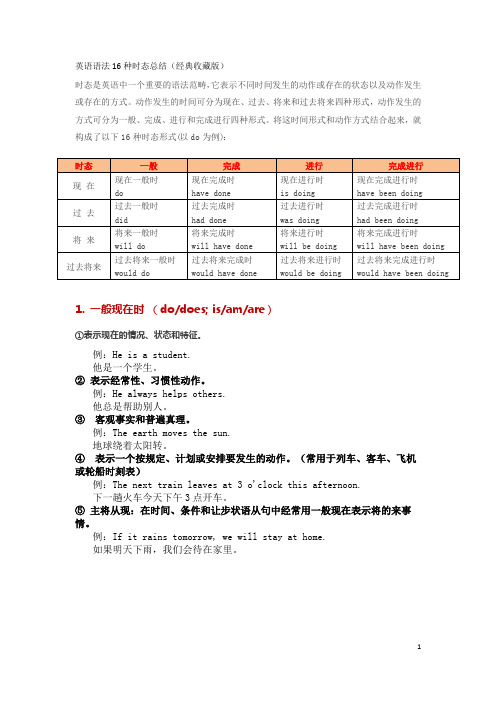
英语语法16种时态总结(经典收藏版)时态是英语中一个重要的语法范畴,它表示不同时间发生的动作或存在的状态以及动作发生或存在的方式。
动作发生的时间可分为现在、过去、将来和过去将来四种形式,动作发生的方式可分为一般、完成、进行和完成进行四种形式。
将这时间形式和动作方式结合起来,就1. 一般现在时(do/does; is/am/are)①表示现在的情况、状态和特征。
例:He is a student.他是一个学生。
② 表示经常性、习惯性动作。
例:He always helps others.他总是帮助别人。
③客观事实和普遍真理。
例:The earth moves the sun.地球绕着太阳转。
④表示一个按规定、计划或安排要发生的动作。
(常用于列车、客车、飞机或轮船时刻表)例:The next train leaves at 3 o'clock this afternoon.下一趟火车今天下午3点开车。
⑤ 主将从现:在时间、条件和让步状语从句中经常用一般现在表示将的来事情。
例:If it rains tomorrow, we will stay at home.如果明天下雨,我们会待在家里。
④现在进行时与频度副词连用,表示说话者或褒义或贬义的感情色彩。
例: He is always helping others.他总是帮助别人。
(褒义)④过去进行时和频度副词连用可以表示说话者或褒义或贬义的感情色彩。
例:When he lived in country,he was always helping the poor.住在乡下时,他总是帮助穷人。
4. 一般将来时①基本结构是will do。
例:We will send her a glass hand-made craft as her birthday gift.我们将送给她一个玻璃的手工制品,作为给她的生日礼物。
②表示“打算…,要…”时,可用 am/is/are going to do。
英语语法16种时态总结

英语语法16种时态总结英语语法是英语知识中十分重要的环节,希望以下文章对您有所帮助!时态是英语中一个重要的语法范畴,它表示不同时间发生的动作或存在的状态以及动作发生或存在的方式。
动作发生的时间可分为现在、过去、将来和过去将来四种形式,动作发生的方式可分为一般、完成、进行和完成进行四种形式。
将这时间形式和动作方式结合起来,就构成了以下16种时态形式(以do为例):一般完成进行完成进行现在现在一般时do现在完成时have done现在进行时is doing现在完成进行时have been doing过去过去一般时did过去完成时had done过去进行时was doing过去完成进行时had been doing将来将来一般时will do将来完成时will have done将来进行时will be doing将来完成进行时will have been doing 过去将来过去将来一般时would do过去将来完成时would have done过去将来进行时would be doing过去将来完成进行时would have been doing1. 一般现在时 (do/does; is/am/are)①表示现在的情况、状态和特征。
例:He is a student.他是一个学生。
② 表示经常性、习惯性动作。
例:He always helps others.他总是帮助别人。
③ 客观事实和普遍真理。
例:The earth moves the sun.地球绕着太阳转。
④ 表示一个按规定、计划或安排要发生的动作。
(常用于列车、客车、飞机或轮船时刻表)例:The next train leaves at 3 o'clock this afternoon. 下一趟火车今天下午3点开车。
⑤ 主将从现:在时间、条件和让步状语从句中经常用一般现在表示将的来事情。
例:If it rains tomorrow, we will stay at home.如果明天下雨,我们会待在家里。
英语语法-十六种时态

构成:S + V过去式 + 其它(时间状语)
1)概念:表示过去某时正在进行的状态或动作。 2)过去进行时的主要用法是描述一件事发生的背景;一个长动作发生的时候, 另一个短动作发生。 3) 常用的时间状语:this morning, the whole morning, all day yesterday, from nine to ten last evening, when, while My brother fell while he was riding his bicycle and hurt himself. It was raining when they left the station. When I got to the top of the mountain, the sun was shining. 典型例题:1) Mary ___ a dress when she cut her finger. A. made B. is making C. was making D. makes 答案C. 割伤手指是已发生的事情,应用过去时。同时,when表时间的同时 性,“玛丽在做衣服时”提供事情发生的背景,因此用过去进行时。 2) As she ___ the newspaper, Granny ___ asleep. A. read; was falling B. was reading; fell C. was reading; was falling D. read;fell 答案B.句中的as = when, while,意为“当……之时”。描述一件事发生的背景 时,用过去进行;句意为 “在她看报纸时,奶奶睡着了。"句中的 fell (fall的 过去时),是系动词,后跟形容词,如:fall sick。
英语语法时态

掌握:一般现在时、一般过去时、一般将来时、现在进行时、过去进行时、将来进行时、现在完成时、过去完成时、现在完成进行时、过去将来时。
一、一般体1、一般现在时(既不“进行”,又不“完成”)(1)表示经常性、习惯性的动作或状态。
We have meals three times a day.(现在经常性、习惯性的动作)He is always ready to help others.(现在经常性、习惯性的状态)(2)表示客观事实、自然现象或普遍真理。
The sun rises in the east.(3)表示按时刻表、计划规定要发生的动作。
Flight A302 departs at 16:30.(4)用于文章标题、报刊、剧本、图片的说明或故事的转折等。
Love Doesn’t Ask Why.(歌曲名)(5)时间、条件、让步状语从句中,用一般现在时表示将来时(主将从现)。
As we get old,we are easy to get across.If you speak slowly,I will understand.Whenever you say,I will not change my mind.(6)动词come,go,leave,start,begin,stop,arrive,return等用一般现在时表示将来时。
Here comes the bus.2、一般过去时(表示“刚才,在过去”之意,暗示“现在已不再这样”。
)(1)表示具体时间发生的动作或状态。
Jack looked very well when I last saw him.表示过去经常性、习惯性的动作或状态。
When I was a boy,I often went to play in that park.(3)叙述某一动作或状态在过去持续了一段时间后停止或在过去某段时间反复发生若干次。
Julie worked in this factory for five years.(4)其它○1用于叙述没有具体时间的动作或状态。
英语常见的动词时态和语态

英语常见的动词时态和语态时态是英语中表达时间和动作发生顺序的重要语法要素,而语态则用于表达主语和动作之间的关系。
掌握常见动词时态和语态的用法,对于提高英语语言的准确性和流利性至关重要。
本文将介绍英语中常见的动词时态和语态,包括一般现在时、一般过去时、一般将来时、现在进行时、过去进行时、将来进行时、现在完成时、过去完成时、将来完成时、一般过去将来时、过去完成将来时、被动语态等。
一般现在时(Simple Present Tense)一般现在时表示经常性、习惯性的动作或客观真理,也用于对现状的描述。
一般现在时的构成是主语+动词原形(第三人称单数要加s或es)。
例句:1. I play football every weekend.2. He reads a book every night.3. Water boils at 100 degrees Celsius.一般过去时(Simple Past Tense)一般过去时用于表达过去某个时间发生的动作或状态。
一般过去时的构成是主语+动词过去式。
例句:1. She studied English last night.2. They went to the park yesterday.3. The movie ended two hours ago.一般将来时(Simple Future Tense)一般将来时用于表示将来某个时间将要发生的动作或状态。
一般将来时的构成是主语+will+动词原形。
例句:1. I will travel to Japan next month.2. We will have a meeting tomorrow.3. She will call you later.现在进行时(Present Continuous Tense)现在进行时用于表示现在正在进行的动作。
现在进行时的构成是主语+is/am/are+动词-ing形式。
过去将来进行时例句

过去将来进行时例句一、什么是过去将来进行时虽然过去将来进行时在英语语法中不常见,但在某些特定情况下可以使用。
过去将来进行时表示过去时间点之前已经计划或决定好的动作或事件,这些动作或事件本应在过去的某个时间点发生,但却没有实现,而是继续在过去的某个时间点之后进行。
下面是一些使用过去将来进行时的特定场景例句。
二、使用过去将来进行时的特定场景例句2.1 旅行计划1.I was going to visit Europe last summer, but then the pandemichappened and I had to cancel my trip.2.We had planned to go hiking in the mountains, but it startedraining heavily, so we had to change our plans.3.They had intended to spend their vacation in Hawaii, but then ahurricane hit the island and they had to postpone their trip.2.2 项目延期1.The construction of the new stadium was supposed to finish lastyear, but due to funding issues, it is still ongoing.2.Our team had scheduled the product launch for next month, but dueto production delays, we had to push it back to the end of theyear.3.The conference was originally planned to take place in person, butdue to the pandemic, it had to be moved online.2.3 未实现的计划1.She had been planning to buy a new car, but then she lost her joband her financial situation changed.2.They had intended to start their own business, but they couldn’tsecure enough funding, so they had to put the plan on hold.3.I had been thinking about studying abroad, but then I got a joboffer th at I couldn’t refuse.2.4 邀请和安排1.My friends had invited me to their party, but I had already madeplans to attend a wedding on the same day.2.The company had scheduled a meeting for tomorrow morning, but dueto a sudden emergency, it had to be postponed.3.He had arranged to meet with his client yesterday, but the clientcalled to reschedule at the last minute.三、总结过去将来进行时是指某个过去的时间点之前已经计划或决定好的动作或事件,在过去的某个时间点之后继续进行。
- 1、下载文档前请自行甄别文档内容的完整性,平台不提供额外的编辑、内容补充、找答案等附加服务。
- 2、"仅部分预览"的文档,不可在线预览部分如存在完整性等问题,可反馈申请退款(可完整预览的文档不适用该条件!)。
- 3、如文档侵犯您的权益,请联系客服反馈,我们会尽快为您处理(人工客服工作时间:9:00-18:30)。
英语语法过去将来进行时
过去将来进行时:表示就过去某一时间而言,将来某一时刻或某一段时间正在进行的动作,主要用宾语从句中,尤其多用于间接引语中。
基本用法:
用于间接引语:Theysaidtheywouldbecoming.(他们说了他们将要来。
)
用于定语从句:Thenewjobhewouldbetakingwasraisingracinghorses.(他将要接受的新工作是养赛马。
)
作用:
1.过去将来进行时可以表示在过去某一时间之后即将进行的动作:
例如:Hesaidhecouldnotcomebecausehewouldbehavingameeting.(他说他不能来因为要开会。
)
2.过去将来进行时表示在过去将来某一时间正在发生的动作:它常和表过去将来的时间状语连用,但上下文清楚时,时间状语亦可省略。
和将来进行时一样,它也常表计划中的事,不表意愿或打算。
它还有一个特点,即常用在宾语从句(尤其是间接
引语)中。
例如:JohntoldusthatMarywouldbecomingnextday.(约翰告诉我们玛丽第二天来。
)
3.过去将来进行时有时也可用在其它从句中:
用在定语从句中:ThenewnamehewouldbeusingwasJackJones.(他将用的新名是杰克琼斯。
)
用在状语从句中:HewouldpaytherestashewouldbeleavingFrance.(其余款项,他将在离开法国时付清。
)
4.过去将来进行时也可用在独立句中:
例如:Thecarstarted.EllenJameswouldbedrivingofftotheuniversit y.(车子发动了。
埃伦詹姆斯要开车到大学去。
)。
